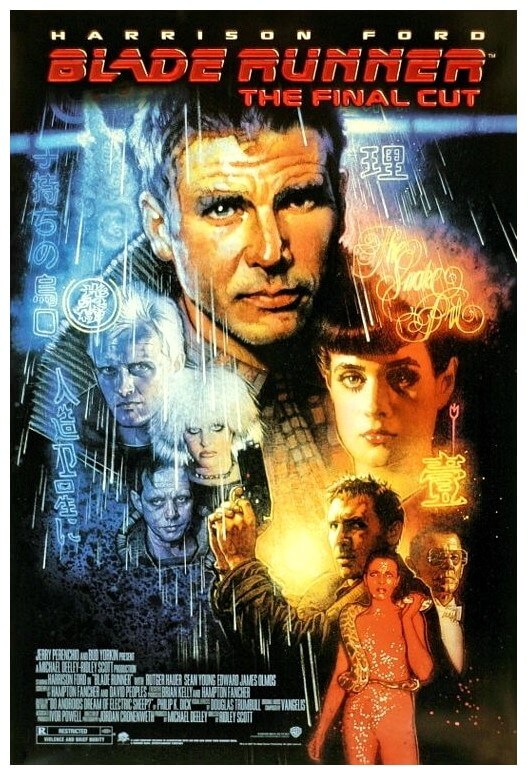Movie Review: Blade Runner
 Blade Runner, released in 1982 but set in 2019, is regarded as one of the greatest all-time science fiction films. It has a 90 percent critics rating and a 91 percent audience rating (from 337,019 audience members) on Rotten Tomatoes and is available for purchase or rent on Amazon Prime and YouTube.
Blade Runner, released in 1982 but set in 2019, is regarded as one of the greatest all-time science fiction films. It has a 90 percent critics rating and a 91 percent audience rating (from 337,019 audience members) on Rotten Tomatoes and is available for purchase or rent on Amazon Prime and YouTube.
In 2019, humanity has expanded its reach beyond the cradle of Earth—those who can have migrated to the new foothold on Mars, leaving those on Earth in squalor and pollution. New technologies have emerged and with them came the replicants, synthetic humans nearly indistinguishable from the real thing.
Replicants are restricted from access to Earth, but some still try to get there. Special agents, known as blade runners, are assigned to hunt down and decommission these dangerous androids. Rick Deckard is one of these agents and is pulled out of retirement to hunt four dangerous replicants.
Ridley Scott’s 1982 film is full of suspense, intrigue and surprise turns everywhere. Blade Runner is a thrill ride to the very end as Deckard pursues the replicants through the city. The desperation of the prey and the uncertainty of the pursuer become more and more obvious as Deckard begins to question what “human” really means and the replicants struggle against the police and the clock. Harrison Ford’s performance encapsulates a jaded, tired Deckard who begins without any personal investment in the case but slowly is dragged in by Rutger Hauer’s Roy, the leader of the escapees who becomes increasingly more violent and unhinged as his time runs out, and a mysterious woman named Rachel, played by Sean Young, who seems to have an interest in Deckard. All these performances are fantastic and serve to draw the viewer further into the world of the blade runner.
The pacing of the end of the film, however, was dissonant to the rest of the film’s nonstop pace, and some of the plot points are rushed and poorly explained. The movie does a shoddy job compared to the source material (the novel Do Androids Dream of Electric Sheep? by Phillip K. Dick) of explaining the internal conflict of Decker and the androids, in exploring what makes someone truly human or alive, and the deeper and more expansive world-building. The obvious care and work put into the novel makes the movie pale in comparison as a mediocre adaptation with pretty visuals. Ridley Scott’s visionary directing style, however, along with brilliant performances by the main and supporting cast, manages to save this film from being a garbled mess of an adaptation.
A dazzlingly unique world, Blade Runner’s aesthetic brilliantly captures a filthy, crowded Los Angeles—the epitome of a cyberpunk universe, with a retro and entirely unique feel to its sets and props. The flying cars, the dingy clubs, the near ever-present synth droning ominously in the background set the tone for the neo-noir thriller. Every frame of this movie is stunning, the detail of the dirty streets, the skyline. Every part of this movie drips personality and showcases Ridley Scott’s directing prowess and helped cement him as an incredible filmmaker.
Blade Runner is not the most action-packed film, and the slow-burn pace of the plot can make it seem disjointed and rambly. It is slow moving and confusing at times and breakneck fast at others, so it can lose you if you don’t hold on to every detail. But despite its flaws, it is very much an enjoyable film that I would recommend to anyone who likes mysteries, dystopian fiction and Ridley Scott’s films.
Related Stories
Popular Stories
If you enjoy The Charlotte News, please consider making a donation. Your gift will help us produce more stories like this. The majority of our budget comes from charitable contributions. Your gift helps sustain The Charlotte News, keeping it a free service for everyone in town. Thank you.
Andrew Zehner, Board Chair







